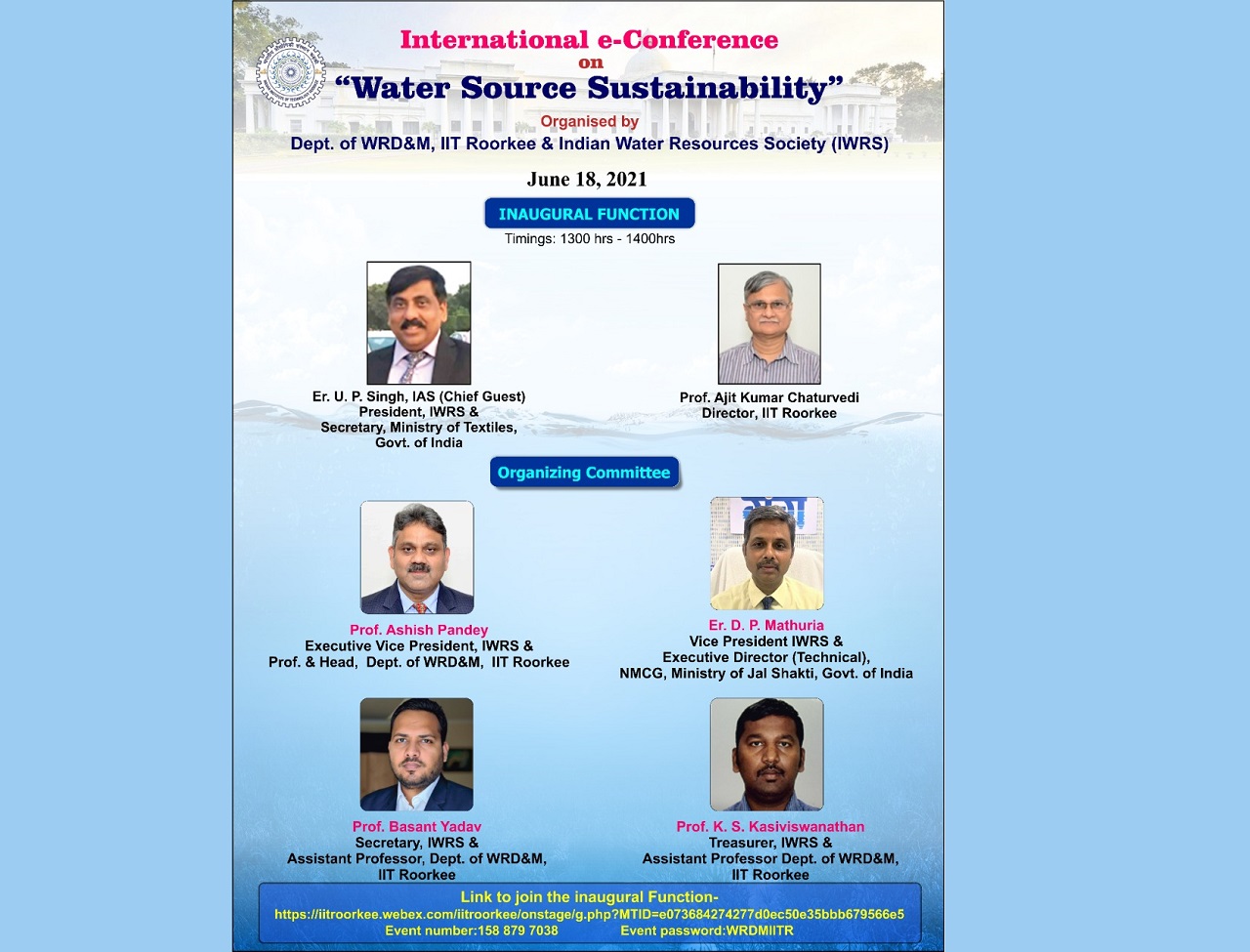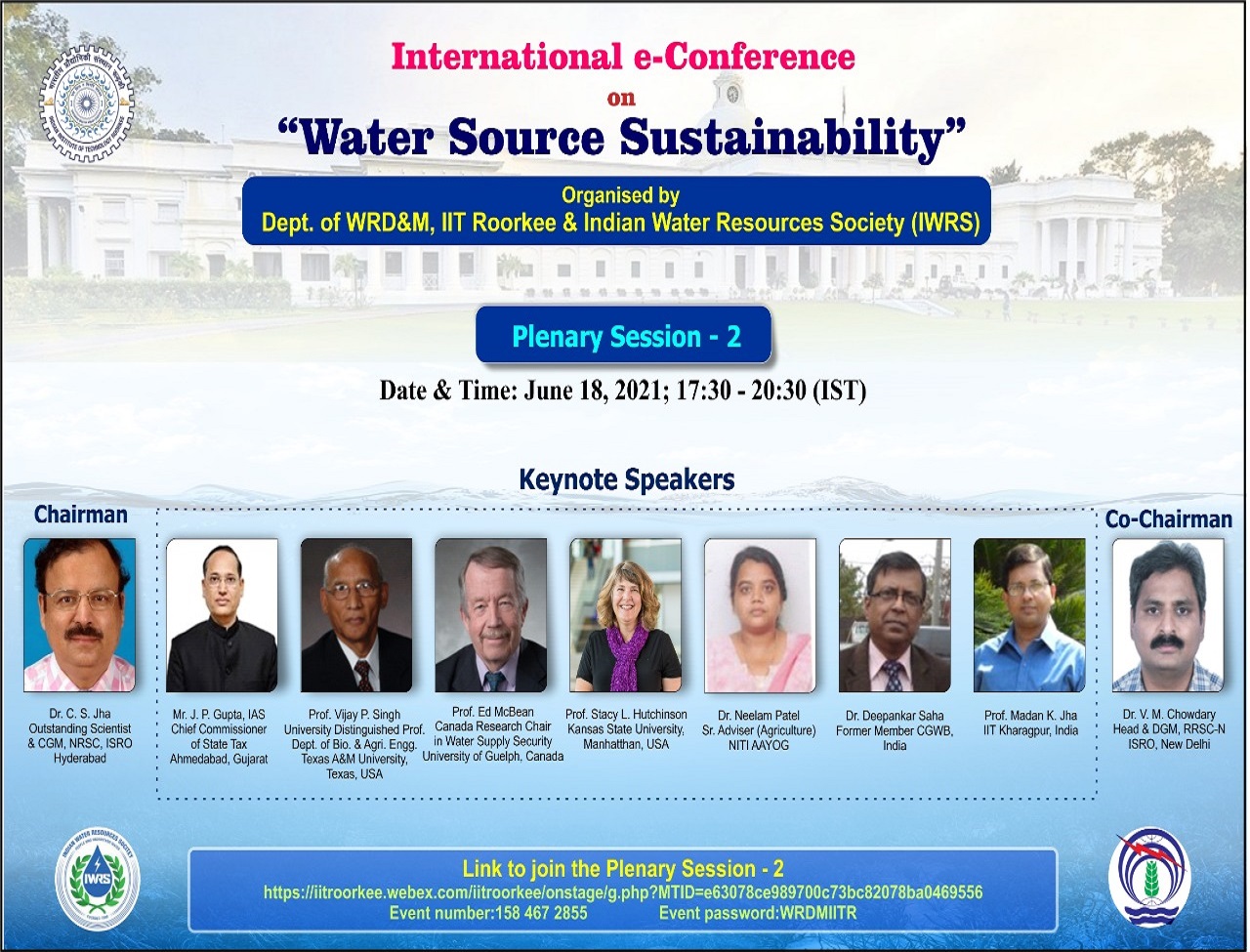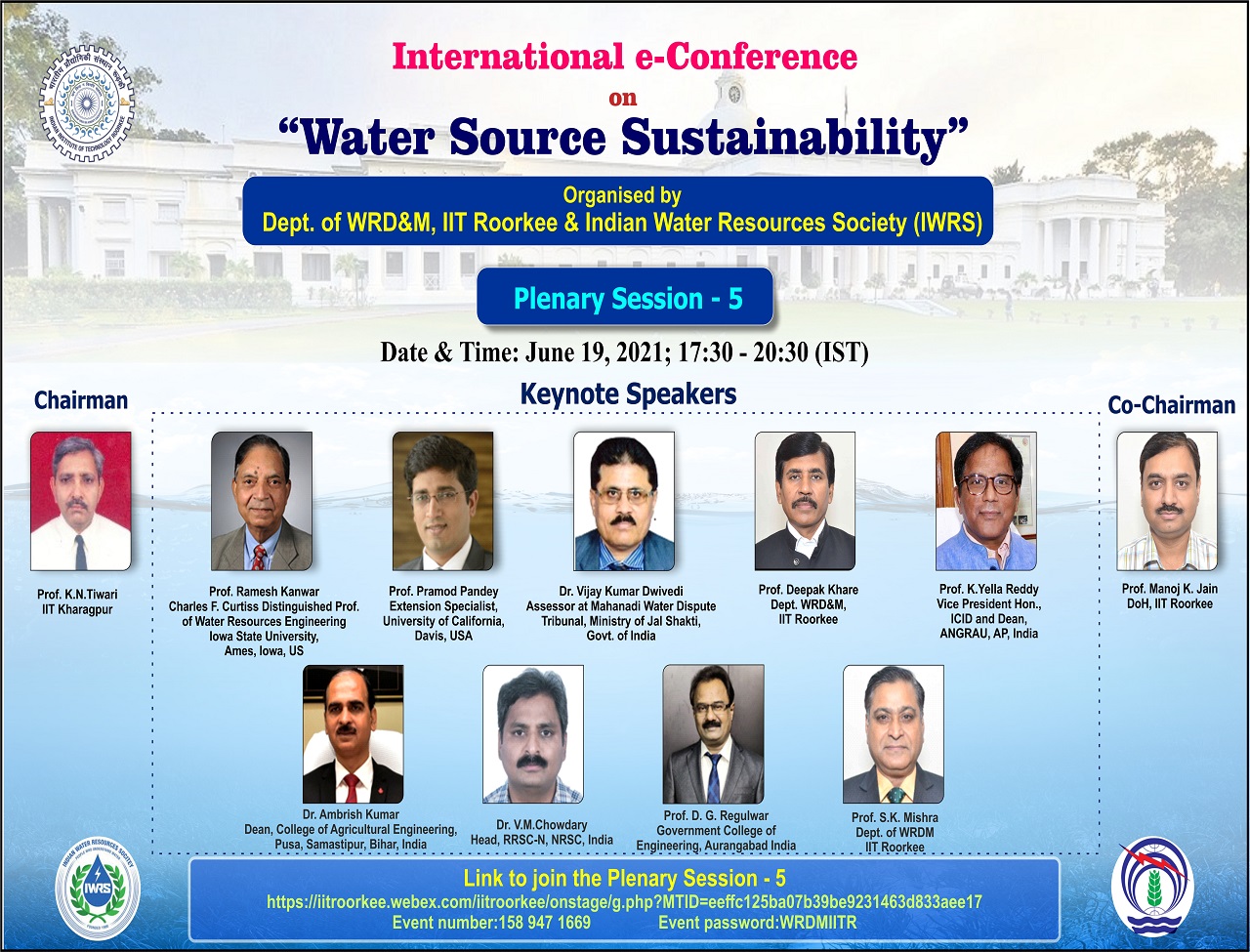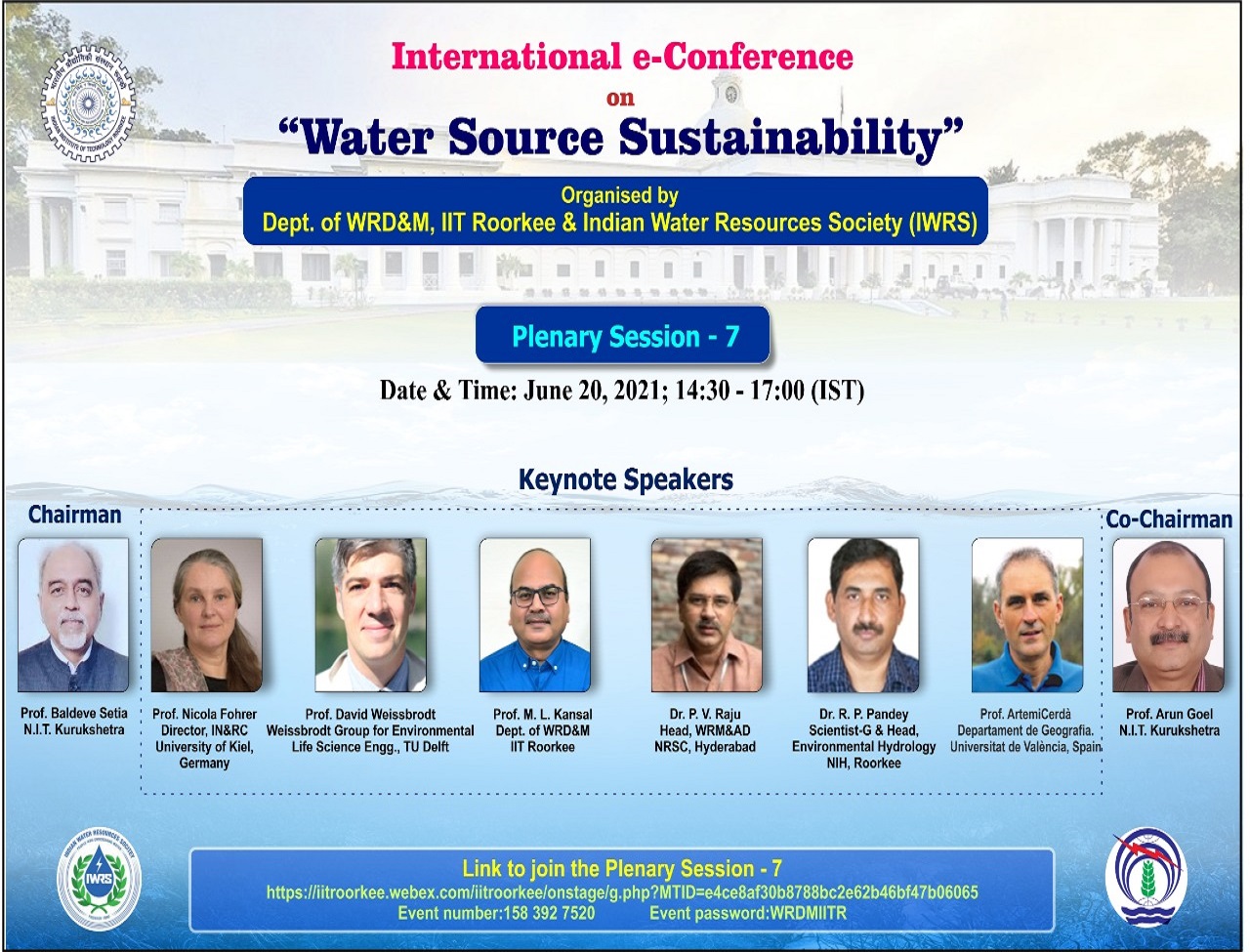Important dates
| 25 APR 2021 | |
| 25 MAY 2021 | |
| 30 MAY 2021 | |
| 10 JUN 2021 | |
| 15 JUN 2021 | Registration closes |
Background
The development of life on earth and human progress depends strongly on the availability, and use of water. Due to rapid increase in population, urbanization and industrialization, water demands are increasing in almost all the sectors in India. Rainfall, particularly during the monsoon months, is the main source of available surface and ground water resources. Non uniform rainfall in time and space resulted in the considerable spatial and temporal variability of water availability in India. More than 60% of the total population of India are residing in villages and agriculture is their main livelihood. Due to weather pattern in India, intermittent irrigation at proper time is must for increasing the crop productivity. Agriculture sector consumes more than 80% of available water. However, water demands are increasing for almost all the sectors. In order to meet the increasing demands for food, environment & energy and to provide better livelihood, the water availability is required to be ensured. The water conserved during the monsoon period are normally utilized for meeting the water demands. Sustainability can be defined simply as the utilization of the water sources while ensuring the ability of future generations to use the same sources. Increasing development, population growth, and natural events such as climate change can have a significant effect on water quantity and quality. The continued water resources developments upstream of existing and planned future supplies can pose a pollution threat and affect the long-term sustainability of the supply. Many innovative source water protection activities such as Water conservation, water treatment and better water management can be considered as practices to ensure the sustainable quantity and quality of water sources. Efforts are being made for sustainable development through supply and demand management, water quality management and water governance.
Surface water resources are available in the rivers and water bodies such as lake, ponds, tanks, and wetlands etc. There are number of existing small, medium, and large dams. However, over the years, the storage capacities of those dams are reducing due to increased sedimentation rate resulting in the reduction of water availability. Although few dams are under construction, but, now a days, taking up the construction of new dams is extremely difficult mainly due to environmental considerations. Due to Climate change, the evaporation from the reservoirs is increasing which further reduces the water availability. Ponds and tanks are either being encroached upon by the people or being used for dumping the waste. In India, there are many wetlands which are in pathetic conditions. For sustaining surface water sources there is a need to address the issues of reservoir sedimentation, management of water bodies and wetland developments etc. Ground water resources, available in different layers of aquifers as well as spring flows are being extensively used for meeting the demands of different sectors. The wastewater is being considered as third important resource. In cities, huge quantity of municipal and industrial wastes is generated polluting the surface and ground water resources. Government of India has initiated planning for recycle and reuse of wastewater for meeting the water demands of different sectors. Industries are being encouraged to use recycled and reuse of wastewater for running their processing units. Further, demand-side water management is another aspect of water resources management which can be defined as reducing the amount of water that is being used for specific purposes. In National Water Policy, it has been emphasized on increasing water use efficiency in all the sector. As agriculture sector is the main consumer of water, this can be achieved through the modernization of Irrigation sector. In case of canal, irrigation is limited to their command areas. Therefore, farmers are using Ground water for irrigation. In many regions, over exploitation of ground water has caused drastic depletion of ground water table. It is because of providing energy free or at subsidized rates as the policy of some State Governments and growing water intensive crops using ground water irrigation by the farmers. Irrigation water use efficiency may be enhanced by adopting on farm water management practices. The treated wastewater may be used for irrigation and other sectors for water source sustainability. In all the sectors, there is a need to enhance water use efficiency adopting suitable measures. Due to climate change, change in rainfall pattern is being observed in many parts of the country affecting the temporal and spatial variability of surface water and ground water resources. Thus, adaptation strategies are required to be evolved to cope with the water problems resulting due to the impact of climate change. The integrated flood management approach is being advocated so that the flood water may be used for the benefits of the society. The water budgeting is required to be carried out based on the supply and demand data for different temporal as well as hydrological & administrative units to identify water scarce regions. Such exercise will be extremely useful for prioritizing the water scarce areas which require immediate interventions. So far, more efforts have been made to increase the supply rather than reducing the demands. Now, it is high time to encourage the demand management on highest priority.
Thus, the scope of this conference is fairly wide and includes any combination of theoretical/ conceptual/applied, analytical/computational, and/or experimental/field approaches used for the furtherance of the understanding in various facets involving Water Supply management, Water Demand Management, Sustaining water sources under climate change, Technological upgradation of Traditional methods for water conservation, Technological developments for ensuring the sustainability of water sources, Treatment Technologies & water quality management, Peoples active participation in water management and Water Governance. This conference will provide an opportunity to policymakers, academicians, researchers, and students to share their experiences and knowledge by the presentation of fundamental/applied scientific advances made in the field of water resources engineering and management for water source sustainability.
Conference Themes
-
1. Water Supply management
• Surface water supply
• Ground Water Developments
• Protecting & Cleaning water bodies
• Surface and groundwater quality
-
3. Sustainability of water sources in urban and rural areas
• Urban hydrology and storm water management
• Smart cities and urban water supply management
• Smart water technologies
• Drinking water management in rural and hilly areas
-
5. Water, Environment, and Health
• Water pollution
• Water supply and sanitation
• Water quality and environment protection
• Wastewater quality and management
-
7. Water governance and capacity building
• Water laws & policy: problems, prospects and consumer perspective
• Knowledge engineering and management
• Education and training
• Internet-based applications
-
2. Water Demand Management
• Efficient Water supply approaches
• best practices to reduce demand
-
4. Sustainable irrigation water management
• Irrigation rehabilitation and modernization
• Precise irrigation methods
• Command area development and management
• Optimal cropping pattern and yield maximization
-
6. Sustaining water sources under climate change
• Water sources under climatic variability and extremes
• Impact of climate change on water sources of arid and semi-arid regions
Call for Abstract
Abstracts of papers (not exceeding 150 words) on the above session themes of the Conference are invited from students/researchers working in the water resources sector latest by May 25, 2021 and the acceptance will be notified by May 30, 2021. The authors of the accepted abstracts are requested to submit the full length papers latest by June 10, 2021. The abstract of the papers can be uploaded through Easychair Link
https://easychair.org/my/conference?conf=icwss21 .
Registration
No registration fee for conference.
Patrons

Er. U. P. Singh
Ministry of Textiles, Government of India

Prof. Ajit K. Chaturvedi
Director, IIT Roorkee
Organizing Committee

Prof. Ashish Pandey
Head, Department of WRD&M, IIT Roorkee

Er. D.P. Mathuria
Vice President, IWRS

Prof. Basant Yadav
Department of WRD&M, IIT Roorkee
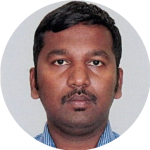
Prof. K. S. Kasiviswanathan
Department of WRD&M, IIT Roorkee
Contact Addresses
Prof. Ashish Pandey
Executive Vice President, IWRS & Professor and Head,
Department of Water Resources Development & Management,
IIT Roorkee, Roorkee-247667, INDIA
Tel: 01332-285251, 285872 (O) Mob. 9412070399
E-mail: ashish.pandey@wr.iitr.ac.in
Prof. Basant Yadav
Assistant Professor & Organizing Secretary
Department of Water Resources Development &Management,
IIT Roorkee,
Roorkee-247667, INDIA
Tel: 01332-284954, 286690 (O) Mob. 9899286153
E-mail: basant.yadav@wr.iitr.ac.in, secretaryiwrs@gmail.com

